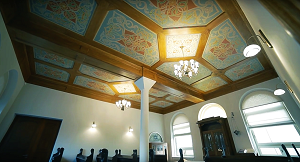The Bente Kahan Foundation (Wrocław), Czulent (Kraków) and Bet Debora (Berlin) invite you to participate in and contribute to the 8th International Bet Debora Conference of European Jewish Women, Activists, Academics and Rabbis
CREATING ALTERNATIVES FOR JEWISH WOMEN IN EUROPE
1 – 4 September, 2016
in Wrocław/Breslau (Poland) – European Capital of Culture 2016
Venue:The White Stork Synagogue, Wrocław, Poland and the Pod Aniołami hotel and conference space
Language of the conference: English
The conference aims to encourage discussion about the organization of Jewish living environments that enable equal opportunities and access for women, both within existing structures and by means of creating alternative spaces. We want to explore the interests and motives that women have formulated, with special emphasis on the work of women in art and culture. We encourage a wide variety of formats, whether it be workshop, lecture, shiur, presentation, installation, etc.
Suggested topics – but please feel free to make your own proposals:
Women in Different Religious Contexts
- In communities of different Jewish denominations
- In alternative/egalitarian minyans
- In rainbow Judaism
- In women’s groups (e.g., rosh chodesh groups, study groups for religious texts, liturgy, cantoral music)
- Interreligious and intercultural dialogue
Jewish Women in History
- Women from Wrocław and other parts of Europe
- Women of the Bible
- Jewish women in women’s organizations
- Women intellectuals
Jewish Women in Arts, Culture, Music, Literature – Past and Present
Theatre, Dance, Music, Film, Arts, Museums, Literature
As audience and sponsors
Jewish Women in Sports and Health Movements
- Sports associations past and present
- Sports and Jewish identity
- Sports and Jewish nationalism
- Sports and religion
- Yoga, meditation and Judaism
Women and Politics
- Jewish feminism
- Communal politics
- Politics of education
- Jewish minority politics
- Human rights
The date of the conference is a reminder of the dramatic history of Jewish women and men in Breslau and in Europe. September 1, 1939, marks the invasion of Poland by the German Wehrmacht and the beginning of World War II. By the end of the war, the Jewish community of Breslau, which had been the third-largest in Germany, was decimated. Breslau became Polish Wrocław. Additionally, September 4, 2016 is the European Day of Jewish Culture, this year dedicated to Jewish languages, which we would like to consider in our conference as well, as German, Yiddish and Polish shaped Jewish life in Wrocław/Breslau.
In the 19th and early 20th century, Breslau was an important intellectual and cultural centre for German Judaism and played a key role in the emancipation of Jewish women. A proposal regarding the possibility of equality between the genders in terms of religious rights and duties was formulated during the third Assembly of German (reform) Rabbis in Breslau in 1846 but the matter was never seriously discussed. Blocked in religious matters, Jewish women fervently pursued emancipation in the secular realm. When German universities opened their gates to women, the percentage of Jewish female students was above average and even higher in Breslau than in other cities. Jewish women shaped local culture, art, and scholarly pursuits, and formed the vanguard of the women’s movement and education.
This year’s conference will be accompanied by a diverse range of activities around the theme of “The Jewish Women of Breslau” including special talks on women active in Breslau before the war and in Wrocław after the war, guided walks, a map of historic sites and an exhibit. These events will serve to embed the conference’s contemporary topics in a deep historic context.
Please submit contribution proposals in English by April 8th, 2016 to alternatives@fbk.org.pl
Proposals should include a description of the planned contribution, estimated time of duration and whether it will be a workshop, shiur, presentation, lecture, etc., in 150 to 250 words. Please submit a brief CV and your contact information as well.
A limited number of travel grants are available for those contributors who would otherwise be unable to attend. Childcare will be provided.
Registration for the conference will open in the spring of 2016. Accommodations are limited as Wrocław is European Capital of Culture 2016. We will reserve suitable lodgings and encourage you to register as soon as possible. There will be a registration fee of 50 Euro, but exemptions will be considered upon request.
For more information: www.fbk.org.pl and www.bet-debora.net
or write to Barbara Pendzich at alternatives@fbk.org.pl

